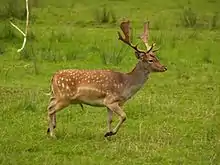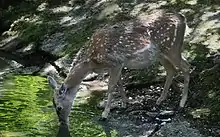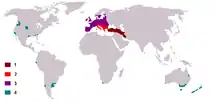Fallow deer
The fallow deer (Dama dama) is a type of deer from the family Cervidae. The animal originally lived in Eurasia, though it has been brought it to other parts of the world, such as Australia.
| Fallow deer | |
|---|---|
 | |
| Male (buck) | |
 | |
| Female (doe) | |
| Scientific classification | |
| Kingdom: | |
| Phylum: | |
| Class: | |
| Order: | |
| Family: | |
| Subfamily: | Cervinae |
| Genus: | Dama |
| Binomial name | |
| Dama dama (Linnaeus, 1758) | |
 | |
| Range 1: Native 2: Possibly native 3: Early human introductions 4: Modern human introductions | |
The male is called a buck, the female is a doe, and the young a fawn. They live for about 12–16 years. All of the fallow deer have white spots on their backs, and black tips at the ends of their tails. Only bucks have antlers, which are wide and shaped like a shovel.
They are grazing animals. They like to live in an area that is mixed woodland and open grassland. They try to stay together in groups of up to 150.
Colours
They have a lot of different coloured coats (hair). There are four main colours: "common", "menil", "melanistic" and "white".[2] The common coat is a brown coat with white spots that are best seen in the summer. In the winter the coat is much darker. The white coat is lightest colored, almost white. The common and menil coat are darker. The melanistic coat is very dark, sometimes even black.

Historical herds
One noted historical herd of fallow deer is kept in the Ottenby Preserve in Öland, Sweden. Karl X Gustav built a drystone wall of four kilometres long around a royal fallow deer herd in the mid 17th century. The herd still exists as of 2006.[3] Another herd lives in Phoenix Park in Ireland. 400-450 fallow deer descend from the original herd introduced in the 1660s.[4]
References
- Masseti, M. & Mertzanidou, D. (2008). "Dama dama". IUCN Red List of Threatened Species. Version 2008. International Union for Conservation of Nature. Retrieved 8 April 2009.
{{cite web}}: CS1 maint: multiple names: authors list (link) Database entry includes a brief justification of why this species is of least concern. - "Fallow deer". www.bds.org.uk.
- Environmental Baseline Study, Lumina Technologies, Öland, Sweden, July, 2004
- "Fauna - Phoenix Park". Archived from the original on 2010-06-04. Retrieved 2011-05-31.
Further reading
- FAO ANIMAL PRODUCTION AND HEALTH PAPER 27. (1982). Deer farming guidelines on practical aspects. ISBN 978-92-5-101137-9. Retrieved on 4 January 2008.
- Clutton-Brock, J. (1978). A Natural History of Domesticated Animals. London, British Museum.
- Lyneborg, L. (1971). Mammals [of Europe]. ISBN 978-0-7137-0548-5.
Other websites
- Fallow deer in New Zealand Archived 2012-04-18 at the Wayback Machine
